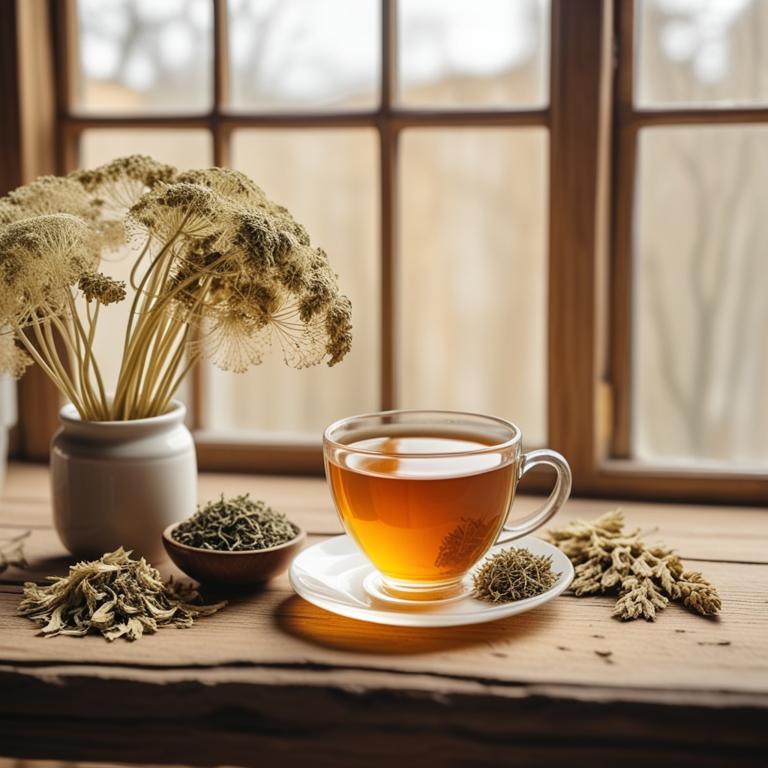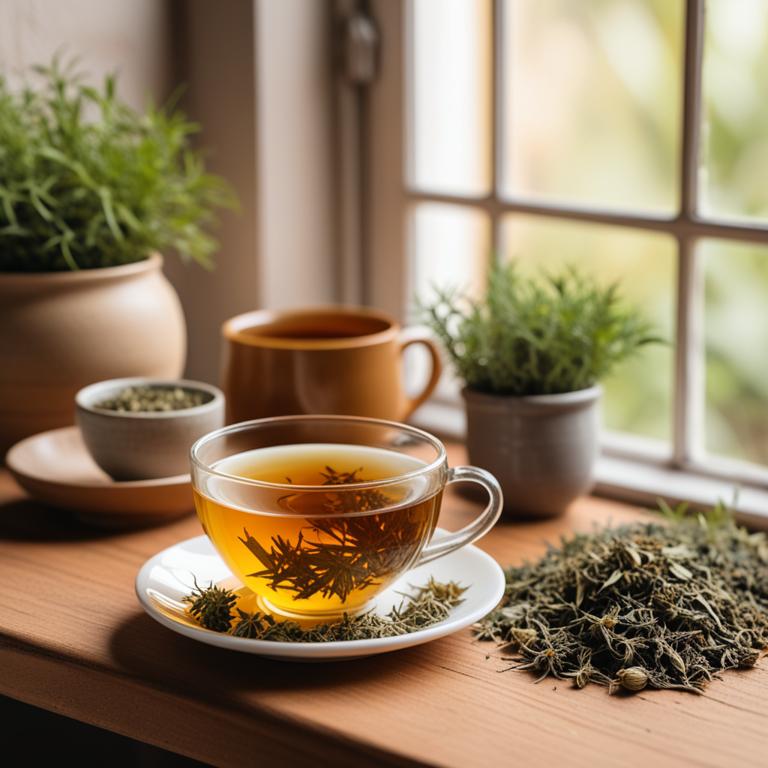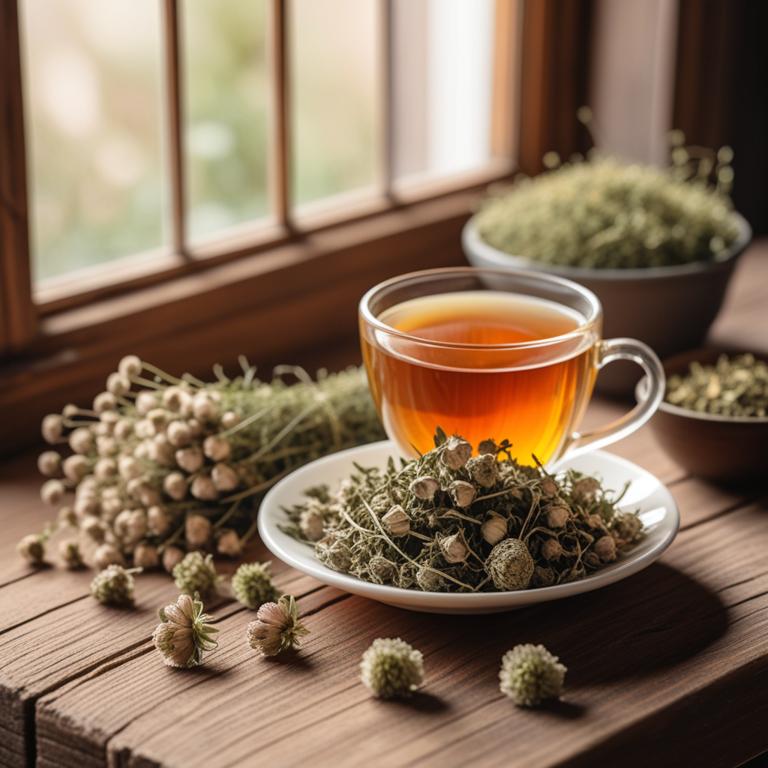11 Herbal Teas For Baldness

Herbal teas have been used for centuries to help with hair loss and baldness.
Some herbs, like Rosmarinus officinalis (rosemary), Ginkgo biloba, and Panax ginseng, are known for their ability to improve blood flow to the scalp, which is essential for healthy hair growth. Rosemary, in particular, has antioxidant properties that help protect hair follicles from damage. Ginkgo biloba, on the other hand, is known to improve circulation, which helps to nourish the scalp and promote hair growth.
Panax ginseng, also known as Asian ginseng, has been shown to reduce stress and anxiety, which are common causes of hair loss. When you drink these herbal teas, the nutrients and antioxidants are absorbed into your body, helping to promote hair growth and reduce the risk of baldness. This can bring many benefits to your life, including increased confidence and a sense of well-being.
With stronger, healthier hair, you'll feel more energetic and motivated, and you may even notice improvements in your skin and nails too.
- 1. Rosmarinus officinalis
- 2. Ginkgo biloba
- 3. Panax ginseng
- 4. Urtica dioica
- 5. Avena sativa
- 6. Serenoa repens
- 7. Curcuma longa
- 8. Lavandula angustifolia
- 9. Aloe barbadensis
- 10. Trifolium pratense
- 11. Angelica sinensis
1. Rosmarinus officinalis

Rosmarinus officinalis teas contains rosmarinic acid, a compound known for its antioxidant and anti-inflammatory properties.
This compound helps to promote hair growth by reducing oxidative stress and inflammation in the scalp. Rosmarinus officinalis also contains carnosic acid, which has been shown to inhibit 5-alpha-reductase, an enzyme that converts testosterone to dihydrotestosterone (DHT), a hormone linked to hair loss. The antioxidant properties of rosmarinic acid and carnosic acid also help to protect hair follicles from damage caused by free radicals, promoting healthy hair growth.
Additionally, Rosmarinus officinalis has been found to stimulate blood flow to the scalp, which is essential for delivering oxygen and nutrients to hair follicles.
- Gather 1 cup of fresh Rosmarinus officinalis leaves or 1 tablespoon of dried leaves.
- Measure 1 cup of boiling water and pour it over the leaves in a heat-resistant cup.
- Let the mixture steep for 5-7 minutes to allow the herbs to release their oils.
- Strain the liquid and discard the leaves. Add honey to taste, if desired.
- Drink the tea 2-3 times a week for 3-4 months to support hair growth.
2. Ginkgo biloba

Ginkgo biloba teas contains active compounds like flavonoids, bilobalide, and ginkgolides.
These compounds help improve blood flow to the scalp, which is essential for hair growth. The flavonoids and bilobalide in Ginkgo biloba teas have antioxidant properties that protect the hair follicles from damage caused by free radicals. Ginkgo biloba's ability to thin blood and improve circulation may also help reduce the formation of blood clots that can lead to hair loss.
By improving circulation and protecting hair follicles, Ginkgo biloba teas may help promote a healthy scalp and support hair growth.
- Gather 1 cup of water and 1 teaspoon of dried Ginkgo biloba leaves.
- Heat the water in a pot until it boils.
- Add the dried Ginkgo biloba leaves to the boiling water.
- Reduce heat and let it simmer for 5-7 minutes.
- Strain the tea and drink 1 cup, 2-3 times a day.
3. Panax ginseng

Panax ginseng teas contains bioactive constituents like ginsenosides, which have been found to improve blood circulation to the scalp.
This increased blood flow helps to nourish hair follicles and promote hair growth. Ginsenosides also have anti-inflammatory properties that may reduce the risk of hair loss caused by inflammation. Another key constituent, ginsenoside Rg1, has been shown to inhibit the production of dihydrotestosterone (DHT), a hormone that contributes to male pattern baldness.
By reducing DHT levels and improving scalp circulation, Panax ginseng teas may help to prevent or slow down hair loss.
- Gather 1 cup of water and 1 teaspoon of dried Panax ginseng root.
- Boil the water and let it cool for 5 minutes.
- Add the dried Panax ginseng root to the cooled water and let it steep for 10-15 minutes.
- Strain the tea into a cup using a fine-mesh sieve or cheesecloth.
- Drink the tea 2-3 times a day for 3-6 months to see noticeable results.
4. Urtica dioica

Urtica dioica teas contains bioactive constituents like quercetin, kaempferol, and isorhapontigenin, which have anti-inflammatory and antioxidant properties.
These properties help reduce inflammation in the scalp, a common cause of hair loss. The tea's high levels of flavonoids and phenolic acids also help prevent oxidative stress, which can damage hair follicles and lead to baldness. Urtica dioica teas also contains histamine, which has been shown to increase hair growth by stimulating blood flow to the scalp.
By reducing inflammation and promoting blood flow, Urtica dioica teas may help prevent and even reverse baldness.
- Gather 1 cup of fresh or dried Urtica dioica leaves.
- Use 1 tablespoon of the leaves and place them in a cup.
- Pour 8 ounces of boiling water over the leaves and let it steep for 5-10 minutes.
- Strain the tea and discard the leaves. You can add honey to taste.
- Drink the tea 2-3 times a day for 6 months to help with hair growth.
5. Avena sativa

Avena sativa teas contains a compound called avenanthramides, which have antioxidant and anti-inflammatory properties.
These properties help to reduce stress and promote a healthy scalp environment, potentially slowing down hair loss. Avena sativa also contains a flavonoid called avenacoside, which has been shown to increase hair growth by promoting the lengthening of hair follicles. Additionally, Avena sativa contains a saponin called avenacoside B, which has been found to improve blood flow to the scalp, helping to nourish and strengthen hair follicles.
By promoting a healthy scalp environment and improving blood flow, Avena sativa teas may help to slow down or even reverse hair loss.
- Gather 1 cup of oat straw (Avena sativa) and 1 cup of water in a saucepan.
- Heat the water over medium heat and add the oat straw. Let it steep for 5 minutes.
- Strain the mixture through a cheesecloth or a fine-mesh sieve into a cup. Discard the oat straw.
- Add 1 tablespoon of honey (optional) to the tea and stir well.
- Drink the tea 2-3 times a day to help with hair growth and baldness prevention.
6. Serenoa repens

Serenoa repens teas contains active constituents like saw palmetto, which has anti-androgenic properties that block the production of dihydrotestosterone (DHT), a hormone linked to baldness.
DHT is a byproduct of testosterone that shrinks hair follicles, leading to hair loss. The herb's inhibitory effect on 5-alpha-reductase, an enzyme that converts testosterone into DHT, also helps prevent hair loss. Additionally, Serenoa repens has antioxidant properties that protect hair follicles from damage caused by free radicals.
By blocking DHT production and protecting hair follicles, Serenoa repens teas may help promote healthy hair growth and slow down baldness.
- Get 1 cup of water and bring it to a boil.
- Add 2-3 tablespoons of dried Serenoa repens root powder to the boiling water.
- Reduce heat to low and let it simmer for 5-7 minutes.
- Strain the liquid into a cup and discard the solids.
- Drink the tea once a day, ideally on an empty stomach.
7. Curcuma longa

Curcuma longa teas contains curcumin, a bioactive constituent with potent antioxidant and anti-inflammatory properties.
Curcumin helps reduce inflammation in the scalp, which can contribute to hair loss. The tea also contains demethoxycurcumin, another active compound that inhibits the activity of 5-alpha-reductase, an enzyme involved in hair loss. Curcuma longa's turmeric also contains antioxidants that protect the hair follicles from damage and promote healthy hair growth.
By reducing inflammation and promoting hair growth, Curcuma longa teas may help slow or prevent baldness.
- Gather 1 teaspoon of dried Curcuma longa root, 1 cup of boiling water, and a cup.
- Steep the Curcuma longa root in the boiling water for 5-7 minutes.
- Strain the liquid into the cup and let it cool.
- Add 1 tablespoon of honey to the liquid and mix well.
- Drink the Curcuma longa tea once a day for 2-3 months to help with hair growth.
8. Lavandula angustifolia

Lavandula angustifolia teas contains linalool, linalyl acetate, and camphor as its main bioactive constituents.
These compounds have anti-inflammatory properties, which help to reduce stress and promote healthy scalp conditions. The antioxidants in Lavandula angustifolia tea, particularly linalool, may help to reduce the formation of dihydrotestosterone (DHT), a hormone that contributes to hair loss. By reducing inflammation and DHT levels, Lavandula angustifolia tea may help to slow down or even halt hair loss and promote hair growth.
Regular consumption of Lavandula angustifolia tea may also improve blood circulation to the scalp, which is essential for hair growth.
- Gather 1 cup of dried Lavandula angustifolia flowers and a tea infuser.
- Boil 1 cup of water and pour it over the dried flowers in the tea infuser.
- Let it steep for 5-7 minutes, then remove the infuser.
- Strain the tea into a cup and discard the flowers. Add 1 tablespoon of honey for taste.
- Drink the tea 2-3 times a week, ideally before bedtime, and maintain a consistent routine for better results.
9. Aloe barbadensis

Aloe barbadensis teas contains aloin, barbaloin, and acemannan as its bioactive constituents.
These compounds have anti-inflammatory properties that help reduce hair loss caused by inflammation in the scalp. The aloin and barbaloin in Aloe barbadensis teas have been shown to slow down hair loss and promote hair growth by increasing blood flow to the scalp and reducing the formation of dihydrotestosterone, a hormone that contributes to baldness. The acemannan, a polysaccharide, stimulates the production of growth factors that promote hair growth and strengthen hair follicles.
By reducing inflammation and promoting blood flow to the scalp, Aloe barbadensis teas may help slow down hair loss and promote hair growth.
- Gather 1 cup of Aloe barbadensis gel and 1 cup of boiling water.
- Mix the Aloe gel with boiling water in a bowl.
- Let the mixture cool down for 5 minutes.
- Strain the mixture through a cheesecloth or a fine-mesh sieve into a cup.
- Drink 1/2 cup of the Aloe tea, 2 times a day, for 2-3 months to help with hair growth.
10. Trifolium pratense

Trifolium pratense teas contains isoflavones, specifically genistein and daidzein, which are bioactive constituents that help prevent hair loss.
These compounds have estrogenic properties, which stimulate hair growth and reduce the risk of baldness. The antioxidants in Trifolium pratense teas, such as kaempferol and quercetin, protect the scalp from damage caused by free radicals and promote a healthy environment for hair growth. Trifolium pratense teas also contains saponins, which improve blood flow to the scalp and nourish the hair follicles.
By using Trifolium pratense teas, individuals may be able to stimulate hair growth and prevent further hair loss.
- Gather 1 cup of fresh or dried Trifolium pratense (red clover) flowers.
- Measure 1 tablespoon of Trifolium pratense flowers and add to 1 cup of boiling water.
- Reduce heat and let it simmer for 5-7 minutes, then strain the mixture.
- Let the tea cool down, then drink 1/2 cup 2-3 times a day to promote hair growth.
- Combine Trifolium pratense tea with other natural remedies, like saw palmetto or biotin, for enhanced results.
11. Angelica sinensis

Angelica sinensis teas contains active constituents like ferulic acid, ligustilide, and butylphthalide.
These compounds have anti-inflammatory and antioxidant properties, which help reduce stress and promote healthy hair growth. Ferulic acid, for example, inhibits the activity of 5-alpha-reductase, an enzyme that converts testosterone to dihydrotestosterone (DHT), a hormone linked to hair loss. Ligustilide and butylphthalide have been shown to improve blood flow to the scalp, increasing oxygen and nutrient delivery to hair follicles.
By reducing inflammation and promoting a healthy scalp environment, Angelica sinensis teas may support the growth of thicker, fuller hair.
- Gather 2 tablespoons of dried Angelica sinensis roots and 1 cup of water.
- Boil the water in a pot and then reduce heat to low.
- Add the Angelica sinensis roots to the water and let it steep for 5-7 minutes.
- Strain the mixture into a cup and discard the roots.
- Drink the tea once a day, preferably before bedtime, for best results.